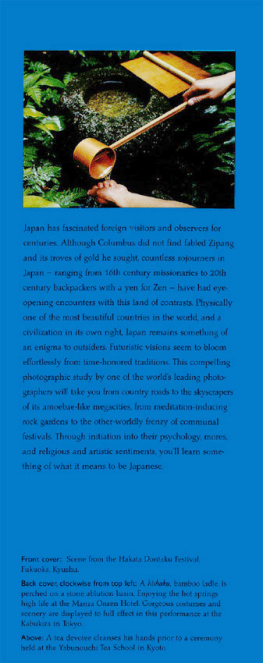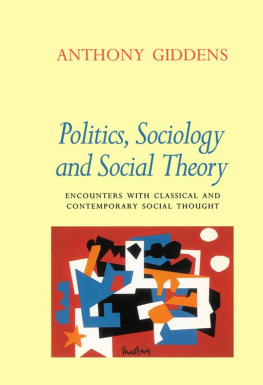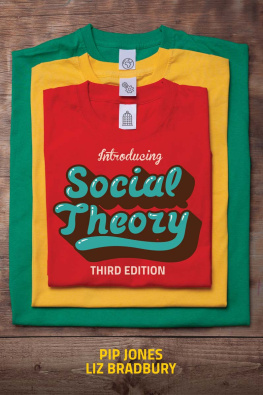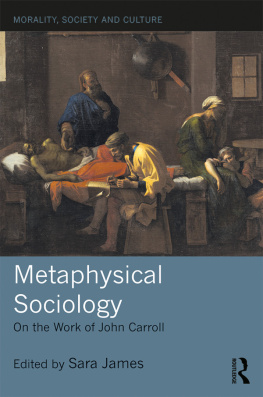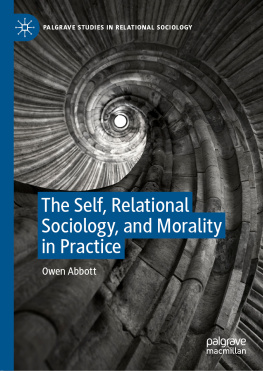ROUTLEDGE LIBRARY EDITIONS: SOCIAL THEORY
Volume 59
SCEPTICAL SOCIOLOGY
First published in 1980
This edition first published in 2015
by Routledge
2 Park Square, Milton Park, Abingdon, Oxon, OX14 4RN
and by Routledge
711 Third Avenue, New York, NY 10017
Routledge is an imprint of the Taylor & Francis Group, an informa business
1980 John Carroll
All rights reserved. No part of this book may be reprinted or reproduced or utilised in any form or by any electronic, mechanical, or other means, now known or hereafter invented, including photocopying and recording, or in any information storage or retrieval system, without permission in writing from the publishers.
Trademark notice: Product or corporate names may be trademarks or registered trademarks, and are used only for identification and explanation without intent to infringe.
British Library Cataloguing in Publication Data
A catalogue record for this book is available from the British Library
ISBN: 978-0-415-72731-0 (Set)
eISBN: 978-1-315-76997-4 (Set)
ISBN: 978-1-138-78405-5 (Volume 59)
eISBN: 978-1-315-76341-5 (Volume 59)
Publishers Note
The publisher has gone to great lengths to ensure the quality of this reprint but points out that some imperfections in the original copies may be apparent.
Disclaimer
The publisher has made every effort to trace copyright holders and would welcome correspondence from those they have been unable to trace.
First published in 1980
by Routledge & Kegan Paul Ltd
39 Store Street, London WC1E 7DD,
9 Park Street, Boston, Mass. 02108 USA and
Broadway House, Newtown Road,
Henley-on-Thames, Oxon RG9 1EN
Set in 10/12 Sab on by
Oxprint, Oxford
and printed in Great Britain by
Page Bros (Norwich) Ltd
Norwich and London
John Carroll 1980
No part of this book may be reproduced in
any form without permission from the
publisher, except for the quotation of brief
passages in criticism
British Library Cataloguing in Publication Data
Carroll, John, b.1944
Sceptical sociology.
1. Sociology
I. Title
301 HM51
ISBN 0 7100 0587 3
Dedicated to Ormond College (University of Melbourne) and its Master (195979), Dr J. D. McCaughey
Contents
This book is a collection of essays, written to a theme. In addition to all the usual vanities and obsessions that drive people to write books I have been stirred by the belief that sociology since 1918 has tended to make the world as dull as it is at its worst, and this tendency needs reversing. My second animating belief is that sociology lost contact with the great metaphysical questions that elevate mens lives, that precipitate crisis and that underlie feelings of success or failure Tolstoys questions of how to live and what to do. From there I have tried to develop a sceptical sociology. The first essay spells out the programme and the following ten attempt to put it into practice. The twelfth essay apologizes.
For their various contributions I am indebted to Lynne Cooke, Anthony Giddens, Alvin Gouldner, Agnes Heller, David Hickman, Bobbie Lederman, Graham Lederman, Robert Manne, Elizabeth Pittman, and above all to Freya Headlam. Many ideas sprang from conversations with Charlotte Zinn von Zinnenberg.
Several of these essays have appeared in journals. The author and publishers would like to thank the following: the editor of Quadrant for permission to reprint Shopping World: the palace of modern consumption, Automobile culture and citizenship and The sceptic turns consumer: an outline of Australian culture; the editor of Theory and Society for permission to reprint In spite of intellectuals; the editor of the Journal of Philosophy of Education for permission to reprint Authority and the teacher.
Preamble
In a word, human life is more governed by fortune than by reason; is to be regarded more as a dull pastime than a serious occupation; and is more influenced by particular humour, than by general principles. Shall we engage ourselves in it with passion and anxiety? It is not worthy of so much concern. Shall we be indifferent about what happens? We lose all the pleasure of the game by our phlegm and carelessness. While we are reasoning concerning life, life is gone; and death, though perhaps they receive him differently, yet treats alike the fool and the philosopher. To reduce life to exact rule and method is commonly a painful, oft a fruitless occupation: And is it not also a proof, that we overvalue the prize for which we contend? Even to reason so carefully concerning it, and to fix with accuracy its just idea, would be overvaluing it, were it not that, to some tempers, this occupation is one of the most amusing in which life could possibly be employed.
David Hume, The Sceptic
It may well be late in the day in our civilization, but not in one of its late developers, our discipline, sociology. While many, with reason, regard that discipline as retarded, and therefore to be closed down and forgotten, there are grounds for reserving judgment a little longer. By and large sociology has, since 1918, taken false paths, or in cases in which it has shown more promise, not advanced very far. Nevertheless, our present offers avenues of endeavour to sociology, worthy enough to justify another enquiry into the mistakes of the past, and another attempt to establish a more fortunate method.
One of the marks of a decadent civilization is that it likes to indulge in introspection, to know where it is, and where it has come from, without much hope about where it is going or indeed much expectation that understanding that future might in any way improve things. Like an ageing person it focuses with mounting absorption on the process of its own decay. There is an important role here, in the heart of the reminiscing, for sociology, but not the type of sociology that has littered bookshops since the 1960s, and catered to the opposite, Utopian craving.
Sociology has behaved rather like a parvenu, who has made money, due to some flair for the historical moment, and wanting to be valued by those of more cultivated taste, invests in the wrong things. His lack of background, his innate hostility to the authority of those by whom he wishes to be recognized, leads him into squandering large reserves of energy on fruitless activity. The three investments that have carried him astray are science, idealism, and social relevance. They have made him uninteresting, except in the minds of other parvenus, who, when true to type, are blind to all but the glitter of their own tinsel. (The social usefulness of business parvenus, whose dynamism boosts the societys economic product, has no equivalent in the cases of their academic counterparts.) Either garish or drab, this sociologys truths have not been piquant enough for our decadent civilization, which, at its best, craves for stimulation of a delicate type.
The three temptations that sociology fell for combined to ensure that it would produce so little of use as far as knowledge is concerned, and so many fiascos in application to real social problems, that we should now be glad to ditch them. We sociologists have managed to add another layer of fat to bureaucracies already wheezing with corpulence, by selling governments, councils, and even business corporations the line that our presence is indispensable. But we could not advise one person how best to organize one day in his life; somehow we thought that we should be better at masterminding abstract Utopias for concrete masses. And what has sociology contributed to Western knowledge since its classics, since Tocqueville and Durkheim showed the positive role of constraint, since Marx explored some of the ways in which man is a social product, and since Weber demonstrated some of the dynamic links between ideas, personality, conduct and institutions! Where contributions to social theory have been made in recent times it has been by intellectuals on or beyond the margins of academic sociology (Hannah Arendt, Philip Rieff, Clifford Geertz). Incidentally, the shrewdest of sociologys prophets, Tocqueville, was aloof from all three temptations.


